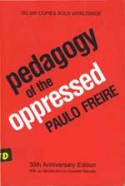 Problem-Posing vs. Problem-Solving (Comments on Paolo Freire’s Pedagogy of the Oppressed)
Problem-Posing vs. Problem-Solving (Comments on Paolo Freire’s Pedagogy of the Oppressed)
When I was searching the online catalog for an afternoon course to take this term, I knew I’d found something that would resonate with me when I read the description for this course. The topic of “foundations of educational philosophy” was one that pertained directly to the reason I chose the Educational Psychology program. Then when I read the full Course Description in the syllabus, I immediately noticed the phrases “critical educational philosophy” and “reproduction of inequality.” I couldn’t wait.
I couldn’t wait because what motivates me during this period of my life is a desire to change one aspect of the educational process. But that one aspect — the teaching of language habits that are less beholden to arbitrary conventions and more consistent with what we now understand from the physical and neuro-physiological sciences — is so general that it relates and applies to virtually all subject areas. So in the process of developing my thesis, I am eager to learn about different educational philosophies and modes of thinking which have been proposed, implemented, and evaluated.
I brought a ‘critical’ (to my definition) attitude or predisposition into the course based on three primary factors. The first is based on the experiences I had during the summer of 2001 when, for three months, I thought I wanted to be a high school teacher. After a six-year career in the Air Force and twenty years as a program manager in the defense electronics industry, I knew I wanted something different. Somehow I got it into my head that I wanted to simply teach high school in a small town. However, as I learned more about what “being a teacher” in the Texas public schools meant in 2001, I knew it would be a bad fit for my temperament. My disillusions with the Texas public schools were many, but primarily included their myopic view of academic credentials as competence, insistence and reliance on standardized tests (pre-NCLB), a salary structure that encouraged teachers to leave the classroom in favor of administration, and, of course, pay graduated on seniority that, for a mid-life adult, was not acceptable.
The second critical aspect that contributed to my pre-class views is a bias in favor of science, or more specifically, a bias favoring a scientific approach or attitude. The more I’ve learned about physics, neuroscience, biology, etc., the more I’ve come to appreciate the general application of the scientific method to a broad array of problems and issues, even those that don’t have anything to do with science per se.
The third notion that has been important in my motivations is a phrase used by Jose Ortega y Gasset (mentioned in the Foreword to Pedagogy of the Oppressed). In his Mission of the University (1930), y Gasset summarizes that mission as to enable students to live “at the height of the times.” I find that a reasonably-idealistic objective to aim for, and, unfortunately, one that the current educational system fails to even acknowledge, much less attempt.
So I was eager to get into Freire’s Pedagogy of the Oppressed.
Through Chapter 2, I was generally onboard. While I was still trying to digest the implications of his clear-cut segregation of the oppressed and the oppressors, I was reassured by some familiar terms. He mentioned science, not unfavorably. He wrote about notions from humanistic psychology that I recognized — fully human (also referred to as fully functioning, full humanness, and self-actualizing by Carl Rogers, Abraham Maslow, and others); becoming, here and now. His discussion about the I and non-I were in keeping with the Taoist notion of yin and yang, which the physicist Niels Bohr called complementarity. And Freire characterized the opposites of the “banking” metaphor that are quite consistent with a scientific orientation: not static and unchanging (in other words, process-oriented, dynamic, always changing); not students as objects or receptacles (but as co-human beings); not independent and unattached (but inter-dependent and inter-related); not isolated (but inter-connected within a context or environment).
However, I grew increasingly frustrated through the remainder of the book. I realize that some of the difficulties I encountered and my initial criticisms might be more attributable to the inherent problems of translation and decisions made by the translator, not Freire. Rather than enumerate a list of what I view as inconsistencies or contradictions which might artifacts of translation, I’d like to focus on two inter-related flaws that I discern in Freire’s philosophy.
Despite his professed embrace of science, his writing (hence his thinking) does not reflect an understanding of what that means. When one engages in the practice of a scientific process, one deals from particulars to generalities, from observations to judgments, from data to results to significance. It seems apparent to me that Freire begins with his conclusions (theories, judgments, opinions, etc.) and persistently sticks to those conclusions, without bothering to actually acknowledge real data, observations, or even examples. If he were presenting Pedagogy as merely another philosophical treatise, I’d have no reason (nor interest) to criticize. But in presenting this a methodology, and couching it in science-friendly terms, I believe he’s obligated to adhere to certain minimum standards of critical discourse.
Instead, he resorts to the same rhetorical techniques commonly employed by propagandists. He presents his own evaluative constructions as though they were objective facts; in the same manner as you noted in class that race is a construct, I would argue that the oppressor, the oppressed, society, elites, the revolution and other similar abstractions are all constructs. Once constructed, Freire proceeds to reify and imbue each with all-encompassing, monolithic, unqualified, unchanging and absolute properties that must necessarily conform to his thesis. After so one-dimensionally defining and characterizing these monolithic constructs, Freire then projects his own evaluations and judgments as if they were coming from the oppressor, society, etc. With no hint of reserve or qualification, Freire attributes to them intentions, motivations, reactions, expectations, and general thinking as if he were actually inside their heads. (Save for one instance I found, on the third page of Chapter 4, where he acknowledged “it is my contention …”)
Given these gross, stereotyped constructions, Freire then turns logic on its head and decries, and eliminates by definition, what would normally be seen as dichotomies. For example, on the fourth page of Chapter 4, he explains that “no dichotomy by which this praxis could be divided into a prior stage of reflection and a subsequent stage of action. Action and reflection occur simultaneously.” How does something prior and something subsequent “occur simultaneously”? Freire eliminates the dichotomy by definition: “Critical reflection is also action.”
Therefore in Freire’s constructed world everything is related, but related as monolithic generalizations. This is perhaps the primary reason why Freire seems to advocate that there is no point in solving any one problem unless, in the course of solving that one problem, you solve all problems as he has constructed them, which ultimately results in “the revolution” that eliminates any vestige of the oppressor/oppressed construct.
Bertrand Russell noted that, “The greatest challenge to any thinker is stating the problem in a way that will allow a solution.” To my reading of Freire, this is the flaw — even if one were to accept his gross generalizations as an accurate depiction of “the current situation” (or one of the current situations) he has so convoluted the statement of the problem(s) with his obtuse and (in my estimation) confused and contradictory reliance on “the people” for solutions, there is simply no place to start. He has stated a problem so gargantuan, so historically-rooted, so globally-interrelated, that it would seem folly to even consider possible solution(s).
This is a shame because, despite my critical reaction, I can say that Freire’s ideas have affected my thinking about two current events.
Regarding the BP oil disaster, the big news from yesterday was the apology offered to BP executive Tony Hayward by Rep. Joe Barton (R-TX). Barton apologized to Hayward and BP for the, in his words, $20B “shakedown” that President Obama had forced on BP. Within four hours of the hearing, however, Barton was forced to backtrack from this apology. But it caused me to think about those individual victims who can be labeled as directly “oppressed” by the oil spill. And who would the “oppressors” be? Just BP? Hardly. Barton’s outburst could clearly be read as representative of a multi-industry, multi-governmental, multi-interested coalition with power to “oppress” everyone outside of that coalition. So what if, rather than focusing on just scapegoating BP, “we” were to take advantage of this opportunity to expose through dialogue the nature of this coalition of oppressors in a limited, semi-Freire-ian approach? I could see the benefit of ‘leveling’ the strata dividing, in this instance, not only the oppressed and the oppressors, but everyone within the context of the global environment.
Likewise, in Santa Fe there is a local controversy that could provide another test bed for a semi-Freire-ian application. On the grounds of the Santa Fe Indian School, now managed by a governing council made up of the nineteen pueblos, the architecturally-significant amphitheater designed by Paolo Solieri over fifty years ago is slated for demolition. The governing council has made it clear, according to news reports, that the amphitheater is too costly to maintain and doesn’t fit into their long-term plans. It sits on tribal land, so the council has sole decision-making authority. However, the tribal land sits within the city of Santa Fe and is serviced by local utilities. Some local officials want to leverage those utilities in an attempt to force the council to reconsider their decision. This also seems like an opportunity to apply Freire’s general approach for dialogue between two parties with different perspectives as to rights, power, culture, and self-determination, because the current dispute arises out of the past injustices. Linking the current dispute to its historical roots would widen the dialogue to address those injustices and their implications for today and the future.
That, to me, would validate at least part of Freire. While it might not end all oppression everywhere, it would go beyond merely posing a problem — it might solve one.
